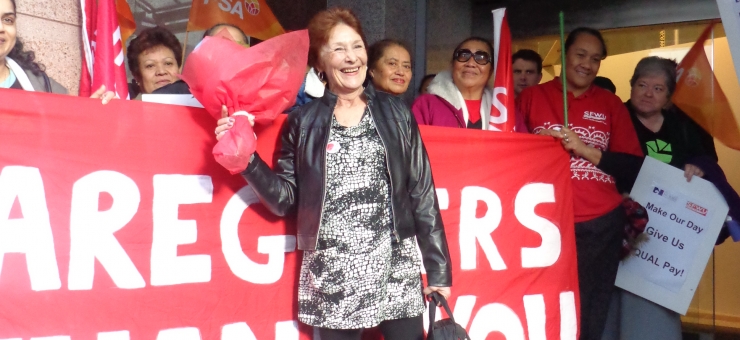Historic pay increase for care workers in New Zealand

55,000 care workers in New Zealand, mainly women, are about to get one of the biggest pay rises ever thanks to the efforts of UNICARE affiliate E tū. The historic pay equity settlement contains pay increases of up to 42 per cent for care and support workers in the aged residential care, home support and disability support sectors. The settlement, once it is ratified by the workers, will lift care and support workers’ pay to between $19.00 and $23.50 hour from 1 July 2017, rising to between $21.50 and $27.00 an hour in July 2021. The statutory minimum wage at present is $15.75 an hour.
The proposed settlement is a huge win and will make a real difference in valuing the work of care and support workers and the people they support. It is a significant step in addressing gender inequality in New Zealand.
It comes after 20 months of negotiations between sector unions, led by E tū, and the New Zealand Government to settle a landmark equal pay case that E tū took on behalf of caregiver and E tū member Kristine Bartlett. The case, lodged in 2012, went all the way to the Supreme Court, with the courts finding gender bias was the cause of Kristine’s low wages.
Kristine says “It will give us dignity and pride and make our lives worthwhile, knowing we’re being paid what we are actually worth. After years of struggling on low wages, hopefully we’re going to have a bit left over to actually enjoy life.”
E tū Assistant National Secretary, John Ryall says the offer once ratified will mean a “once in a lifetime pay rise which will end poverty wages for this mainly female workforce and set them on the path to a better life. We’re delighted today’s proposed settlement recognizes the justice of Kristine’s case and the wonderful work of Kristine and other professional carers.”
Tens of thousands of care and support workers will now vote on the proposed settlement in coming weeks.
Adrian Durtschi, Director of UNICARE commends this historic achievement: “Care workers all around the world are looking with hope to New Zealand. Low wages caused by gender bias is common in a lot of countries. The New Zealand pay equity settlement is a huge step to overcome it. We will work to replicate this achievement in other countries.”

